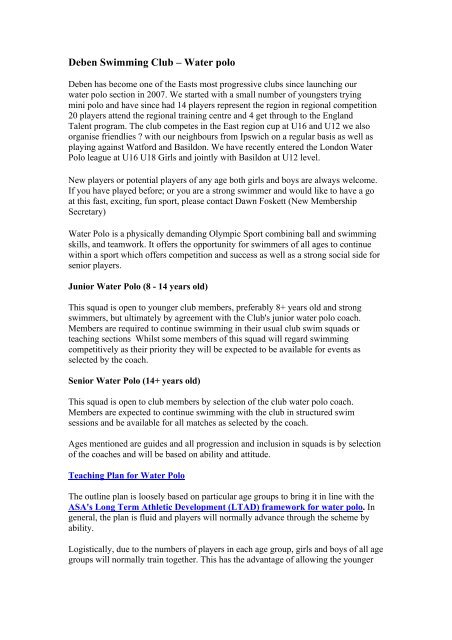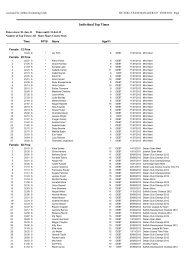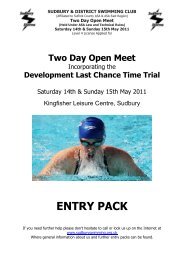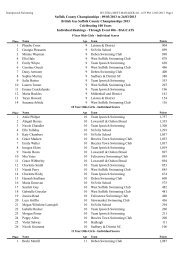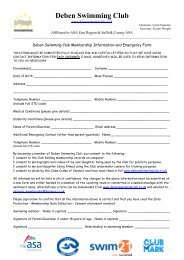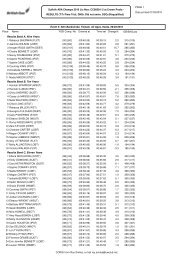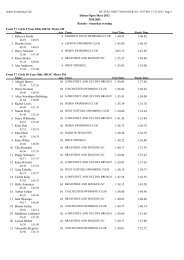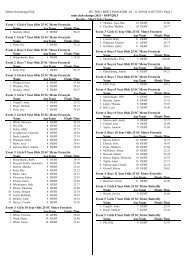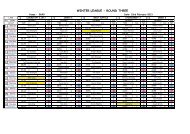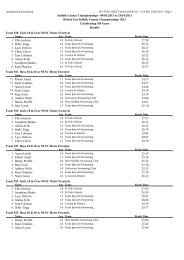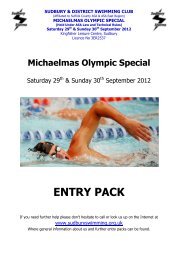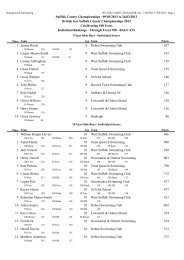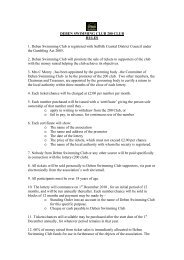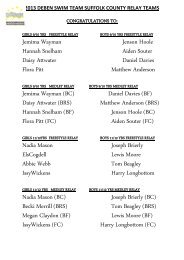Deben Water Polo information - Deben Swimming club
Deben Water Polo information - Deben Swimming club
Deben Water Polo information - Deben Swimming club
You also want an ePaper? Increase the reach of your titles
YUMPU automatically turns print PDFs into web optimized ePapers that Google loves.
<strong>Deben</strong> <strong>Swimming</strong> Club – <strong>Water</strong> polo<br />
<strong>Deben</strong> has become one of the Easts most progressive <strong>club</strong>s since launching our<br />
water polo section in 2007. We started with a small number of youngsters trying<br />
mini polo and have since had 14 players represent the region in regional competition<br />
20 players attend the regional training centre and 4 get through to the England<br />
Talent program. The <strong>club</strong> competes in the East region cup at U16 and U12 we also<br />
organise friendlies ? with our neighbours from Ipswich on a regular basis as well as<br />
playing against Watford and Basildon. We have recently entered the London <strong>Water</strong><br />
<strong>Polo</strong> league at U16 U18 Girls and jointly with Basildon at U12 level.<br />
New players or potential players of any age both girls and boys are always welcome.<br />
If you have played before; or you are a strong swimmer and would like to have a go<br />
at this fast, exciting, fun sport, please contact Dawn Foskett (New Membership<br />
Secretary)<br />
<strong>Water</strong> <strong>Polo</strong> is a physically demanding Olympic Sport combining ball and swimming<br />
skills, and teamwork. It offers the opportunity for swimmers of all ages to continue<br />
within a sport which offers competition and success as well as a strong social side for<br />
senior players.<br />
Junior <strong>Water</strong> <strong>Polo</strong> (8 - 14 years old)<br />
This squad is open to younger <strong>club</strong> members, preferably 8+ years old and strong<br />
swimmers, but ultimately by agreement with the Club's junior water polo coach.<br />
Members are required to continue swimming in their usual <strong>club</strong> swim squads or<br />
teaching sections Whilst some members of this squad will regard swimming<br />
competitively as their priority they will be expected to be available for events as<br />
selected by the coach.<br />
Senior <strong>Water</strong> <strong>Polo</strong> (14+ years old)<br />
This squad is open to <strong>club</strong> members by selection of the <strong>club</strong> water polo coach.<br />
Members are expected to continue swimming with the <strong>club</strong> in structured swim<br />
sessions and be available for all matches as selected by the coach.<br />
Ages mentioned are guides and all progression and inclusion in squads is by selection<br />
of the coaches and will be based on ability and attitude.<br />
Teaching Plan for <strong>Water</strong> <strong>Polo</strong><br />
The outline plan is loosely based on particular age groups to bring it in line with the<br />
ASA's Long Term Athletic Development (LTAD) framework for water polo. In<br />
general, the plan is fluid and players will normally advance through the scheme by<br />
ability.<br />
Logistically, due to the numbers of players in each age group, girls and boys of all age<br />
groups will normally train together. This has the advantage of allowing the younger
players to be mentored by the older. This enhances the skill acquisition of the younger<br />
players.<br />
It should also be noted that girls and boys are able to compete together in mixed teams<br />
until aged 16.<br />
"Mini-<strong>Polo</strong>" FUNdamentals Age 8-11<br />
The <strong>club</strong> normally introduces water polo to swimmers of about 8 or 9 years of age in<br />
the form of "mini-polo"; the only criteria being the ability to swim confidently.<br />
Mini-polo is a smaller, more basic game than <strong>Water</strong> <strong>Polo</strong> itself and has been<br />
introduced to teach young players of any age up to about eleven or twelve years old<br />
the basics of the full game.<br />
It is also a great multi-skill activity which teaches the fundamentals of aquatics and<br />
sport as a whole, in line with Long Term Athlete Development (LTAD).<br />
The best thing about mini-polo is its wide adaptability! You can take any size of pool,<br />
whether deep or shallow, any number of young boys and girls, of different ages;<br />
ability and size and modify the game to suit requirements. It's as simple as that...there<br />
really aren't any rules to use if you don't want.<br />
NO RULES??<br />
In fact, the fewer the rules imposed on the players, the easier it<br />
is for them to learn and, more importantly, the more fun it is!<br />
Although official equipment is available, it's not necessary - to<br />
get started, all we need is a ball and a pool!<br />
At the early stages of the teaching plan, concentration is on the<br />
players rather than on team progress and emphasis is therefore<br />
more on participation, having fun in the water and playing<br />
simple games. However, we also focus on the equipment, the<br />
basic techniques and the essential ball skills with 'fun' drills to<br />
maintain the interest of the players.
During this stage, players are progressively<br />
moved on to more advanced skills as they:<br />
• Are able to swim more confidently<br />
• Are at home in the deep end of the<br />
pool<br />
• Can perform egg beater leg kick and<br />
• Have some basic ball handling<br />
Familiarisation with the Equipment<br />
Balls Costumes<br />
Caps Goals<br />
Pitch size Pitch markings<br />
Use of log books<br />
Basic skills without the ball<br />
<strong>Swimming</strong> training for stamina <strong>Swimming</strong> training for<br />
speed<br />
Leg work (egg-beater) Head up front craw<br />
Focus on body position, legs, arms Head up backstroke<br />
Stop and Go! Breaststroke<br />
Starting, stopping, turning without the ball Change strokes<br />
Changing direction Zig-zag (attack and<br />
defence)<br />
Sideways movement Jump half turn<br />
Jumping forwards, backwards, sideways,<br />
upwards<br />
Basic skills with the ball<br />
<strong>Swimming</strong> with the ball - head up front Passing to partner while<br />
crawl; head still over the ball<br />
swimming<br />
Picking up the ball from underneath Starting, stopping, turning<br />
with the ball<br />
Passing wet and dry Passing long and short<br />
Passing to front, left and right Catching from front, left<br />
and right<br />
Catch and pass in one motion Position in water - hips up<br />
'Walking' the ball Dummying<br />
Simple shooting - no defender Straight shot and lob<br />
Goalkeeping 1 v Goalkeeper attack<br />
1 v Goalkeeper attack -receive pass from Basic extra man attack and<br />
left and right and shoot<br />
2 v 1 attack on goal<br />
defence
Introduction to competition<br />
Organisation and duration of competitions Basic rules of the game<br />
One hand Standing on the bottom<br />
Adaptation of rule for mini polo Ball under<br />
Rules relating to pitch markings Holding<br />
Sinking Pulling back<br />
Entering the water Game organisation<br />
Refereeing<br />
Basic game tactics<br />
Competition<br />
All play all positions Basic rules of the game<br />
Basic attacking play Finding space in attack<br />
Awareness of teammates Shape - not crowding the<br />
'pit'<br />
Basic defensive play Simple press defence<br />
Goalside marking Covering<br />
Blocking in front Counter attacking<br />
Possession games as an introduction to<br />
competition<br />
Under 12 East Region Summer Cup and<br />
LWPL U12’s<br />
Age 12-13<br />
Continue swim training for fitness,<br />
stamina and speed<br />
Gradual introduction of individual team<br />
member responsibilities<br />
Skill Development<br />
Conditioned' competition -<br />
small sided games<br />
Basic competition<br />
Introduce T20 for fitness<br />
evaluation<br />
Greater emphasis on 'team'<br />
play<br />
Concentration continues on the above skills development as these are basic to the<br />
game plus:<br />
'Spider' Goalkeeping<br />
Protecting the ball Introducing contact<br />
Shooting - range of shots (back shots,<br />
push, tip, etc)<br />
Shooting from pass<br />
More advanced tactical skills and positional play<br />
Narrowing down positional play to 1 or 2<br />
positions<br />
<strong>Water</strong> discipline
Goalkeeping<br />
Competition<br />
Age 14-15<br />
Setting the arc Passing lanes<br />
'Pit' play 'Pit' defence<br />
Man up Man down<br />
Positioning Distribution<br />
Post to post mobility<br />
Ordinary and major fouls Player substitution<br />
Entry into the water - during play,<br />
substitution, after goal<br />
Under 14 competitions East Region Cup Regional Training Academy<br />
and LWPL<br />
ASA Academy National Club competition National Training Academy<br />
This stage concentrates not only on player development but also on team<br />
development; what it means to work as part of a team and being a team member<br />
Lots more of the above - can't have enough of it - plus development of more advanced<br />
skills:<br />
Specific positions introduced & developed Positional play around the<br />
e.g. goalkeeperleft side, right side arc<br />
Role of C/F ('Pit player'), point, wings, Role of the 'Pit defender'<br />
drivers<br />
Marking line of ball and front marking Counter attacking<br />
Stealing and intercepting the ball Rotational attack<br />
Press defence 'Dropping'<br />
Beating the press- driving past defender Picks and screens<br />
Managing the 30 second possession clock Switching'<br />
Specific positions for set plays and man- Protecting the ball<br />
ups<br />
Role of the goalkeeper in organising 'Foul'/'No foul'<br />
defence<br />
Role of the goalkeeper in organising man<br />
down defence<br />
Competition<br />
Identification of team strengths,<br />
weaknesses<br />
Adaptation of tactics during<br />
game play
Age 16-17<br />
Identification of opposition strengths,<br />
weaknesses<br />
Rules<br />
Possession clock Time-outs<br />
Specific rules for goalkeepers Role of the table<br />
Rules relating to coach and team positions<br />
on poolside<br />
Responsibilities of match<br />
officials<br />
Under 16 competitions East Region cup<br />
and LWPL<br />
Regional Training Youth<br />
ASA Youth National Club competition National Training Youth<br />
Refine above skills<br />
Competition<br />
Integration with senior players<br />
Under 18 competitions NWPL with Iceni<br />
and LWPL<br />
National Training Junior


